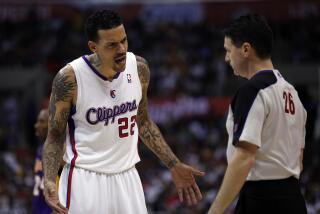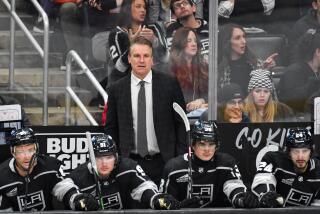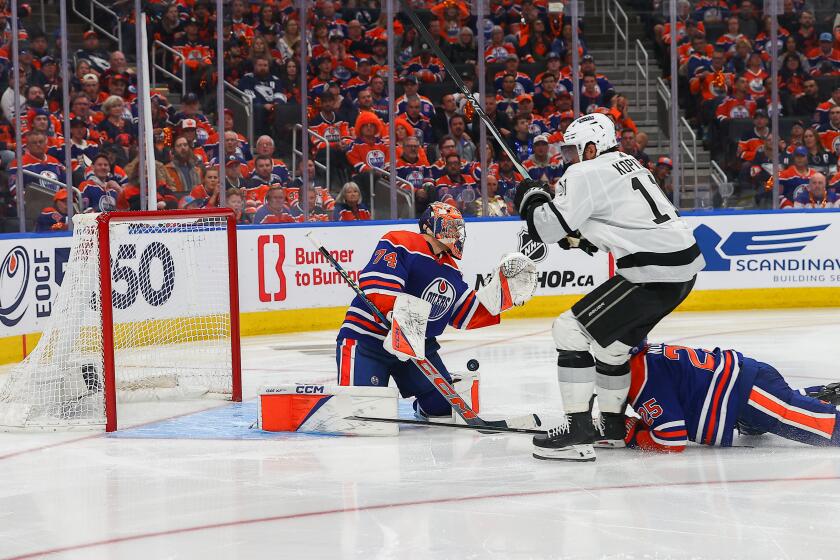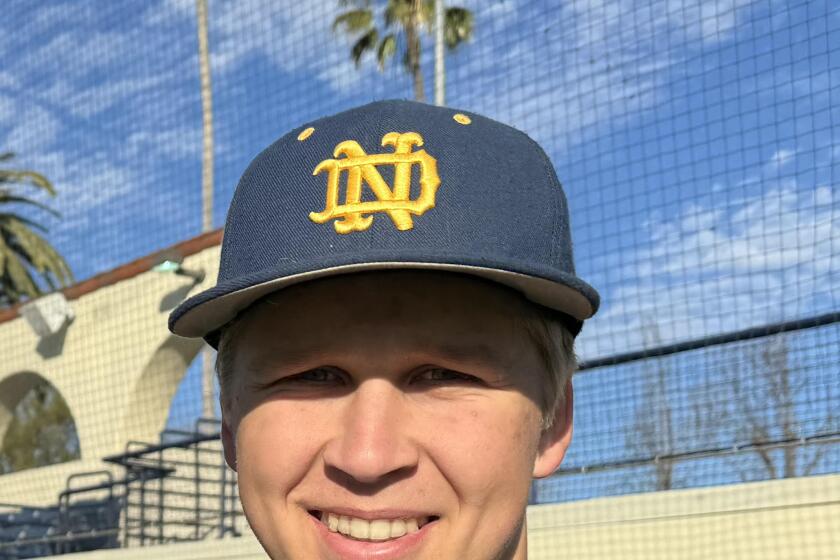Taking broadcast career seriously made big difference for Jim Fox
After more than two decades as the analyst on Kings telecasts, Jim Fox is probably better known for his fine work in breaking down plays and providing context over the air than he is for his 10-year playing career with the Kings.
“I do run into a lot of people who don’t know that I played. And they watch me on TV. But I’m used to it by now,” he said.
“When Wayne Gretzky came, that’s when the spotlight shone on the Kings and I was part of that for a year or two. In all honesty, you go back to Canada and people are there all the time with hockey cards, even today. But 24 years now, as a broadcaster, I can understand why they might not be able to think back that far because it’s been a while since I played.” But his second career had a rocky start.
Fox, honored by the Kings on Thursday night as part of their Legends Nights series, retired as a player in 1990. Holding a microphone instead of a hockey stick didn’t seem like it would lead anywhere for him, and he acknowledged that he initially treated his new endeavor with less respect than it deserved.
He said he doesn’t ever look back at old tapes, but if he did, he’d probably cringe.
“I am fortunate that the people at FOX and the Kings stayed with me early on because the transition for me was not natural at all,” he said before Thursday’s ceremony. “I remember games probably through the first two years, maybe three, where at the end of the game I didn’t even know the score of the game because I was lost in the technical issues and people talking in your ear and replays and just trying to do all this and put all this stuff together.
“I think it was the year the Kings went to the finals, in ’93, we started doing a lot of games that were important and we started doing a lot of games where everyone was watching the team and I just started to have more fun.
“But in all honesty, I was embarrassed. You come from doing something that you’re excelling at, to something that I struggled with and I was a rookie again. It was just not that fun. Then you get some confidence and then hopefully you communicate better.”
His longtime broadcast partner, Bob Miller, helped change his attitude and the course of his broadcast career.
“He gives me the best seat in the house. I love his energy because it’s appropriate energy,” Fox said.
“People always ask me what he taught me, and it’s very difficult to explain. I came from being a player. You’re a big wheel. You’re a professional athlete. And when I started being a broadcaster, I didn’t think it was important. Then I watched Bob every night and how he prepared and how hard he worked to be a professional and I said, ‘You know what, there’s some importance to this. You can make this a life.’ That taught me. Maybe it was a self-worth issue.
“It’s not something I’m just doing after I was a player. It’s my career now. It was Bob’s approach every night that taught me that, but it took a while.”
Fox, 53, said his three brothers and sister and their spouses would share the night with him at Staples Center, in addition to people from his hometown of Coniston, Canada. His mother, he said, wasn’t feeling strong enough to make the trip to Los Angeles.
He was touched to be recognized in the Legends Nights series and credited Hall of Fame wing Luc Robitaille, the Kings’ president of business operations, for creating an event that provides links between past and present.
“Part of his plan was to start acknowledging the history of this team. We were getting better as a team on the ice at that point, so maybe that kind of renewed the interest,” Fox said. “Back when I played we didn’t necessarily have the success. We had good year, bad year. Good year, bad year. Just kept going. No continuity. No consistency.
“I’ve been here 34 years and I only know the L.A. Kings and I’m happy that three times a year they get a chance to look back and maybe thank some players that have done something for the organization and in turn, we get a chance to thank everyone that has helped us.”
More to Read
Get our high school sports newsletter
Prep Rally is devoted to the SoCal high school sports experience, bringing you scores, stories and a behind-the-scenes look at what makes prep sports so popular.
You may occasionally receive promotional content from the Los Angeles Times.







